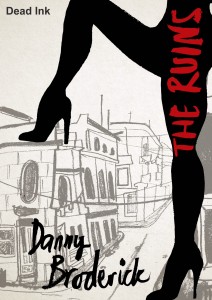‘Cosmonauts’ by William Winfield Wright
-Reviewed by Ian Chung–
As the first publication from Wormwood Chapbooks (a division of Rough Writers Publishing), William Winfield Wright’s Cosmonauts makes for an engaging and promising debut. (I was pleased to see that Wright already has another chapbook forthcoming from the press). Despite consisting of only 10 poems over 18 pages, the chapbook succeeds admirably in demonstrating the thematic range of Wright’s poetry, as well as his facility in inhabiting others’ voices and wielding language. Of particular note is Wright’s use of poetic sequences, as reflected in the titular poem with which the chapbook opens, and midway through, the straightforwardly titled ’32 Fucking Poems About Chess’.
While ‘Cosmonauts’ references the twentieth-century space race between the former Soviet Union and the United States (‘Our sky is the higher sky, / above whatever they might put there’), all seven sections of the sequence appear less concerned about the grand sweep of history and more preoccupied with its impact on individuals. Even when the poem seems to make general statements (‘It is we who hit the moon, we who smile / into their faces with our practical Soviet teeth’, ‘Television has made everything famous’), these have already been grounded within an individual’s voice (‘What Khrushchev Knows’ and ‘Retirement for Yuri Gagarin’ respectively), so that the effect is to draw attention to both what is being said and who is saying it (and by extension, why). Wright is also attentive to the frailty of the interpersonal in the face of the march of historical time, as in this single sentence that makes up the fourth section, ‘The Hands on Einstein’s Watch:
‘The clock you take with
will slowly lag
the clock you leave behind
until the moment when
your twin marries your lover
and their bearded children
welcome you back
to whatever year it is.’
This interest in human relationships takes an interesting turn when mediated through the game of chess. Many of the 32 poems decry the boredom induced by chess, e.g. ‘I never call it fucking / but wouldn’t it / be better than this?’ or ‘Two rooks chase each other / around and around and around / while the kings just sit’. There is also plenty of passive-aggressive behaviour on display that lends humour to the poem: ‘if I catch you / moving the pieces again / I’ll fucking kill you’, ‘You can’t do that. / You can’t fucking do that. / Oh, ok.’ Yet as the sequence progresses, moments of muted tenderness begin to emerge and thread themselves through the anger:
‘I had that dream again
where I’m a pawn off the board
and the queen’s already been taken
and we are talking and she’s laughing
and then the game is suddenly over
and she has to go back
to her stupid fucking husband.’
By the final page of ’32 Fucking Poems About Chess’, the ‘I’ of the sequence is allowed to make this confession: ‘She did everything wrong, / … / and I’d tear my fucking arm off / to see her again.’ It feels like an instant of raw, unguarded honesty, and it works precisely because so much of the rest of the sequence is about venting frustration at the game of chess and at the other player. In spite of its title, there are actually two sections in the sequence that do not feature the word ‘fuck’ or its derivatives, 16 in the very middle of the sequence (‘Actually those trophies / aren’t for playing chess, / baby’) and 32 at the very end (‘Now let’s try it together’). These act to temper the sequence’s hostility, allowing it to end on a conciliatory note (‘Now let’s try it together’), which is at the same time already undermined by the sequence’s temporal uncertainty, so that what appears to be a positive ending might just as well have been the catalyst for producing all this chess-related anger in the first place.
Outside of these sequences, Wright is equally adept at the single self-contained poem. A poem like ‘Hotel Lycanthropy’ infuses its central metaphor with a painful desperation, portraying two people who seem to bring out the worst in each other (‘the full moon of your forehead’), and who now have to face up to the realisation that despite their best efforts, ‘still nothing can stop this transformation / where we use this small space to run wild.’ Yet here, too, the relationship seems fraught with ambiguity, as there is a clear hint that this hotel room is in fact their habitual haunt (‘I shave three times a day’). So are they really bad for each other, or is there a perverse freedom to be gained in this ‘transformation’ that traps them? Perhaps the penultimate poem of the chapbook, ‘Gary Kasparov’s Little Brother’, best captures this paradox that animates many of the poems in Cosmonauts:
‘The problem with longing
is that there is no object
you cannot know when you’re done
or how to stop.
…
The problem with desire
is that there is an object
and when everything points toward it
everything else is aligned to keep it away.



